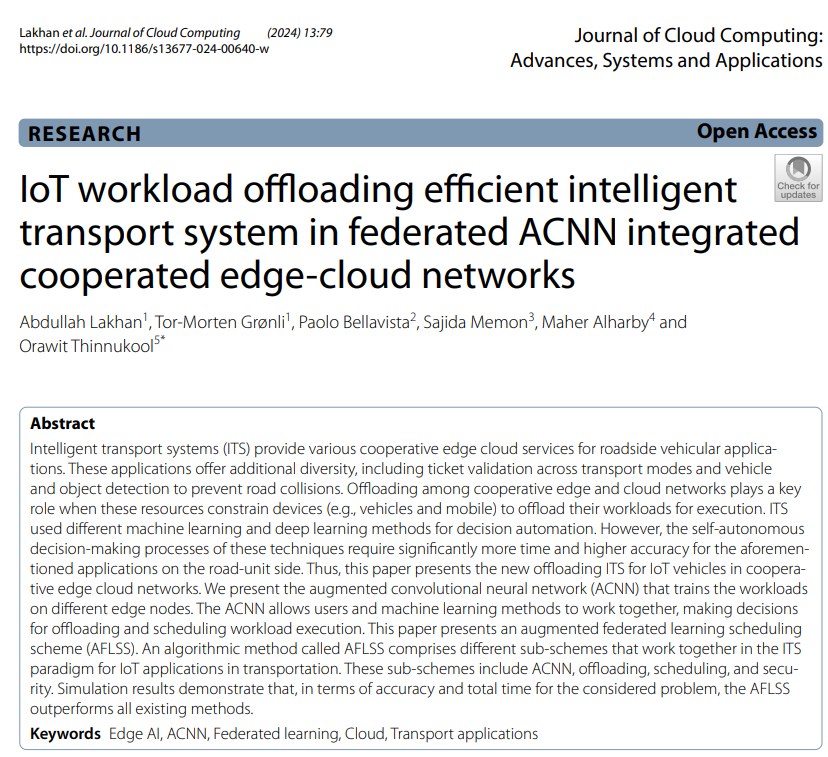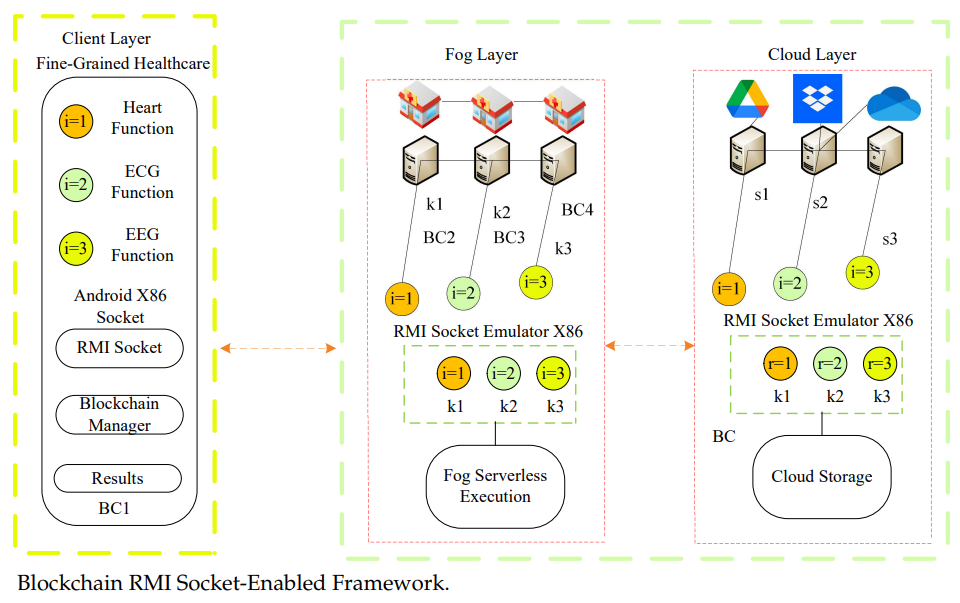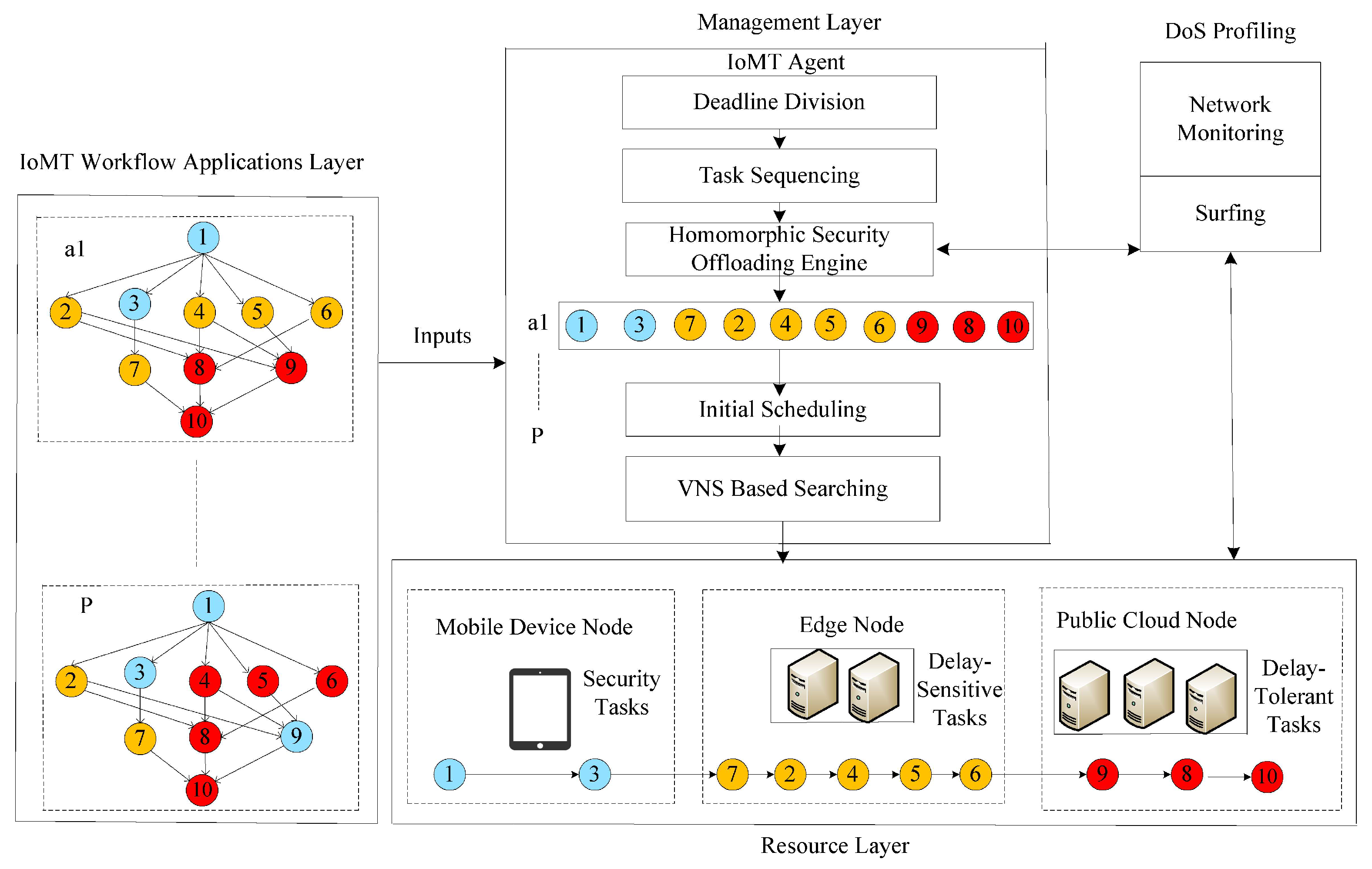
2025
Orawit Thinnukool
Intelligent transport systems (ITS) provide various cooperative edge cloud services for roadside vehicular applications. These applications offer additional diversity, including ticket validation across transport modes and vehicle and object detection to prevent road collisions. Offloading among cooperative edge and cloud networks plays a key role when these resources constrain devices (e.g., vehicles and mobile) to offload their workloads for execution. ITS used different machine learning and deep learning methods for decision automation. However, the self-autonomous decision-making processes of these techniques require significantly more time and higher accuracy for the aforementioned applications on the road-unit side. Thus, this paper presents the new offloading ITS for IoT vehicles in cooperative edge cloud networks. We present the augmented convolutional neural network (ACNN) that trains the workloads on different edge nodes. The ACNN allows users and machine learning methods to work together, making decisions for offloading and scheduling workload execution. This paper presents an augmented federated learning scheduling scheme (AFLSS). An algorithmic method called AFLSS comprises different sub-schemes that work together in the ITS paradigm for IoT applications in transportation. These sub-schemes include ACNN, offloading, scheduling, and security. Simulation results demonstrate that, in terms of accuracy and total time for the considered problem, the AFLSS outperforms all existing methods.

https://journalofcloudcomputing.springeropen.com/articles/10.1186/s13677-024-00640-w
2022
Pattarraporn Khuwuthyakorn
The usage of digital and intelligent healthcare applications on mobile devices has grown progressively. These applications are generally distributed and access remote healthcare services on the user’s applications from different hospital sources. These applications are designed based on client–server architecture and different paradigms such as socket, remote procedure call, and remote method invocation (RMI). However, these existing paradigms do not offer a security mechanism for healthcare applications in distributed mobile-fog-cloud networks.

2022
Orawit Thinnukool
2022
Orawit Thinnukool
The purpose of the DERMA fusion technique is to analyze certain areas of interest in ECG peaks to identify the desired location, whereas FrlFT analyzes the ECG waveform using a time-frequency plane.
Furthermore, detected highest and lowest components of the ECG signal such as peaks, the time interval between the peaks, and other necessary parameters were utilized to develop an automatic model. In the last stage of the experiment, two supervised learning models, namely support vector machine and K-nearest neighbor, were trained to classify the cardiac condition from ECG signals. Moreover, two types of datasets were used in this experiment, specifically MIT-BIH Arrhythmia with 48 subjects and the newly disclosed Shaoxing and Ningbo People’s Hospital (SPNH) database, which contains over 10,000 patients. The performance of the experimental setup produced overwhelming results, which show around 99.99% accuracy, 99.96% sensitivity, and 99.9% specificity https://www.mdpi.com/2075-1729/12/6/842
2022
Orawit Thinnukool
Mobile-cloud-based healthcare applications are increasingly growing in practice. For instance, healthcare, transport, and shopping applications are designed on the basis of the mobile cloud. For executing mobile-cloud applications, offloading and scheduling are fundamental mechanisms. However, mobile healthcare workflow applications with these methods are widely ignored, demanding applications in various aspects for healthcare monitoring, live healthcare service, and biomedical firms. However, these offloading and scheduling schemes do not consider the workflow applications’ execution in their models.

2022
Orawit Thinnukool
The research develops a new, cost-effective and stable IoMT framework based on a blockchain-enabled fog cloud. The study aims to reduce the cost of healthcare application services as they are processing in the system. The study devises an IoMT system based on different algorithm techniques, such as Blockchain-Enable Smart-Contract Cost-Efficient Scheduling Algorithm Framework (BECSAF) schemes. Smart-Contract Blockchain schemes ensure data consistency and validation with symmetric cryptography. However, due to the different workflow tasks scheduled on other nodes, the heterogeneous, earliest finish, time-based scheduling deals with execution under their deadlines. Simulation results show that the proposed algorithm schemes outperform all existing baseline approaches in terms of the implementation of applications.